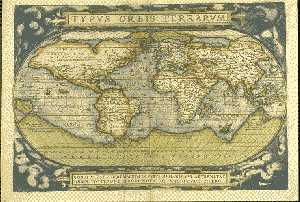

William of Orange (William the Silent) nearly succeeded in uniting the Netherlands against Spain, but religious discord wrecked this dream and he ended up with only the Northern provinces, who declared him hereditary stadtholder (he was assassinated in 1584, but the House of Orange still rules).
Although the might of Spain is formidable, there are cracks in its invincibility. The kingdom is mortgaged and over-extended, the wealth of the New World has gone into making war. English Sea Dogs and Dutch Sea Beggars raid its sea trade (the French do their share when they can), and the English defeated the Armada in 1588. Philip is near the end of his reign -- died in 1598, the same year that the Peace of Vervins will be signed between France and Spain. This treaty will mark the beginning of peace and prosperity in France and the rise of French power in Europe.
Culturally, this is the age of Cervantes and El Greco, but Spanish orthodoxy and the Inquisition do not encourage original thought. This is also the century of Ignatius Loyola, the creation of the Society of Jesus and its rise as a force to be reckoned with in the Counter-Reformation. (By the way, the Jesuits have been banned from France after one attempted to assassinate Henri IV around Christmas 1594).
![]() Home
to Poulet Gauche
Home
to Poulet Gauche![]() Back
to World Affairs
Back
to World Affairs ![]() Bibliography
Bibliography
The Drake and the English defeated the Spanish Armada in 1588, which was a high point in the development of British national pride.
This is an age of genius: Shakespeare has written his historical plays and many of the comedies, although the great tragedies have yet to come. Marlowe died in a tavern brawl in 1593, cutting short a promising career. Spenserís Faery Queen has recently been published.
The charming Earl of Essex is still Elizabethís favorite, and has not yet committed the treason that will lead him to the block. In 1591 she sent him to aid Henri IV in his struggle against the League, but he wasnít very useful. Elizabethís money has been: she has contributed around 400,000 pounds over the years to Henri IV. She disapproves of him having made a separate peace with Spain in 1598.
There have been bad consecutive harvest years in England (as elsewhere in Europe) in the 1590s. However, things are looking up in the East India trade.
In 1587 Elizabeth of England finally executed Mary Queen of Scots (a Guise, and queen of France during François IIís brief reign) after 20 years of captivity. Her son, James VI is king of Scotland, and the likely heir to the throne of England. He is prey to the usual factionalization and squabbling of the Scottish nobility, and has been since an infant. The Calvinist religion of Knox prevails in Scotland.
Web Sites:
All the great Italian city-states are pretty much sliding downhill, in terms of political and economic glory. Venice had its last great moment at the Battle of Lepanto in 1571, where the Turks were soundly defeated, breaking their power over the Mediterranean. (They were quite perceptive about recognizing Henri IV as king of France early on, though). Naples was conquered by the Spanish in 1504, and is the center of Spanish power in Italy. Milan is in the hands of the Spanish. In Florence, the Medici are not what they once were, although Grand Duke Ferdinando I is a good ruler. Although extravagant, he is committed to the well-being of Florence and maintaining her independence. He built hospitals, a college at Pisa, and expanded the fleet in the port of Leghorn. His policy of religious toleration drew many Protestants and Jews to Leghorn. His niece, Maria deíMedici will marry Henri IV in 1600 and become the mother of Louis XIII.
Web Sites:
The last Jagello king of Poland died in 1572, and the monarchy became elective. Their first choice was Henri, duc díAnjou, the brother of Charles IX. However, as soon as Charles died in 1574, Henri fled Poland to become King of France (Henri III). The current king is Sigismund III, son of King John of Sweden. He was raised by Jesuits and is quite violently supporting the Counter-Reformation. After his fatherís death in 1592 he claimed the Swedish throne. He spends a lot of his time and Polish blood at war in Sweden and is pretty useless to Poland.
![]() Home
to Poulet Gauche
Home
to Poulet Gauche![]() Back
to World Affairs
Back
to World Affairs ![]() Bibliography
Bibliography
Ivan IV (called "the Terrible"), who had ruled Russia for most of the 1500s, died in 1584, leaving a tremendous power vacuum. The nominal czar is Feodor I, a weak and feeble son of Ivan IV. The actual government is in the hands of the boyars, notably Nikita Romanov (related to Ivan IVís first wife) and Boris Godunov, brother-in-law of Feodor. Russia is currently in social, economic, and dynastic turmoil -- but it looks like the Romanovs will emerge victorious.
There is some extremely limited contact between Russia and the lands to the west of it (i.e. Europe), and the Russians tend to view Europeans as barbarians, which is only fair as the Europeans tend to view Russians as barbarians. [Note that Ivan IV sent France a diplomatic note deploring the St. Bartholomewís Day massacre.] Montaigne records meeting the ambassador of Muscovy in Rome, and mentions that they "knew so little of our lands" that he brought letters of introduction to the Pope and to the governor of Venice, thinking Venice to be ruled by the pope.
![]() Home
to Poulet Gauche
Home
to Poulet Gauche![]() Back
to World Affairs
Back
to World Affairs ![]() Bibliography
Bibliography
![]() Home
to Poulet Gauche
Home
to Poulet Gauche![]() Back
to World Affairs
Back
to World Affairs ![]() Bibliography
Bibliography